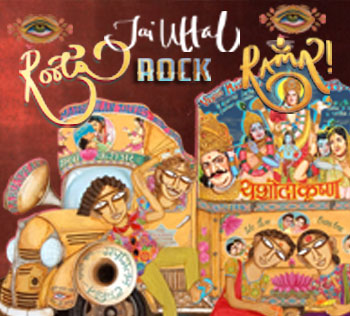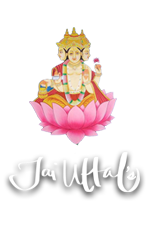
Celebration, meditation, dance of the devas, love song to the universe . . . Jai Uttal’s new album Roots, Rock, Rama! is all of that and more.
ORDER ROOTS, ROCK, RAMA TODAY
The whole world’s myriad musical colors coruscate like a bejeweled shawl tossed from the shoulders of a goddess on this landmark two-CD recording. It manages to pack a lifetime’s spiritual and musical quest into seventy-eight minutes of glorious music from an innovator whose work transcends any category or genre designation.
Celebration, meditation, dance of the devas, love song to the universe . . . Jai Uttal’s new album Roots, Rock, Rama! is all of that and more.
The whole world’s myriad musical colors coruscate like a bejeweled shawl tossed from the shoulders of a goddess on this landmark two-CD recording. It manages to pack a lifetime’s spiritual and musical quest into seventy-eight minutes of glorious music from an innovator whose work transcends any category or genre designation.
Jai Uttal has been rightly hailed as a world music pioneer. Singer, multi-instrumentalist and producer, he was among the first to hear the universal heartbeat in the variegated rhythms of the globe. But his powerful, plangent voice and panoramic musical vision have also long been at the core of the yoga community’s tradition of call-and response devotional chanting known as kirtan. While his music is deeply rooted in Indian classical tradition—he studied long and hard under the Indian sarod master Ali Akbar Khan—it is also plentifully imbued with echoes of reggae, rock, folk, Brazilian music, Bollywood and other sounds from across the musical universe. All of these diverse and colorful strands are woven together beautifully on Roots, Rock, Rama!
“I feel that this album is the completion of a cycle,” Jai says. “And it’s a cycle of many years. I wanted to put every mood, feeling and experience I’ve had into these songs. I wanted to offer a rainbow of devotional feeling.”
The title Roots, Rock, Rama! is a play on the name of the Bob Marley song “Roots, Rock, Reggae.” Marley is one of Jai’s key musical influences, and the first disc of his new album is deeply steeped in reggae’s earthy rhythms, hypnotic bass lines, jubilant horn charts and soulful vocal harmonies. Jai calls this disc the “Rama Sun” CD.
The second CD, known as “Rama Moon,” evokes an entirely different mood. Grounded in the gentle, lilting sway of Brazilian samba, it also touches on the pastoral splendor of the more acoustic tracks from the Beatles’ White Album. The Beatles are another major influence, and Jai has brought their pioneering fusion of Indian music and Western pop into the 21st century.
“CD 1 is more extroverted songs,” he explains. “It’s a celebration, I guess you could say. And CD 2 is the more introverted side of kirtan. It’s kind of like me sitting on my couch and singing quietly.”
The more upbeat “Rama Sun” songs were recorded live-in-the-studio in L.A. by Jai and his longtime backing band, anchored by drummer Dave Allen, bassist Mark Gorman and guitarist Steve Postell (David Crosby, Jennifer Warnes, John Oates, Dave Koz, many more). The sessions skillfully capture the deep musical empathy that developed among these exceptional musicians over the years. Clarion-call horn charts are contributed by Peter Apfelbaum and Jeff Cressman (Santana, Don Cherry, Trey Anastasio, Charlie Hunter, Tito Puente, Shelia E, Joshua Redman, others), two veterans of Jai’s groundbreaking Pagan Love Orchestra who have also played roles on more recent Jai Uttal albums such as Thunder Love and Queen of Hearts. Another frequent collaborator, vibrant singer Tina Malia (Kenny Loggins, India.Arie, Bonnie Raitt, Bassnectar, Deva Premal and Miten, Omar Faruk Tekbilek, Peter Yarrow, and more), forms part of an angelic backing vocal choir that also includes Prajna Vieira, Gaura Vani and Sandy Cressman. Together, they bring a joyous, gospel feel to kirtan’s call-and-response vocalizing.
But the centerpiece of the whole thing, of course, is Jai Uttal’s amazing voice. With his unique gift for phrasing and melismatic ornamentation he can wrest a thousand moods from a simple Sanskrit mantra. Many of the songs on the “Rama Sun” disc were composed by Jai in response to the need for a specific emotional color for a live kirtan experience. The rootsy, funky “Primordial Swamp Beat” was written on an airplane. And CD 1’s final track, “H.E.L.P. (Hari’s Ecstatic Love Potency)” weaves in the refrain from the Beatles’ 1965 hit “Help.” “We hear all the translations and interpretations of the mantras,” Jai says. “But to me, they’re all saying ‘Help!’ You know? Like, ‘God, help me. I cannot take the next step without your help.’ There’s some humor in putting a Beatles song alongside a Hari Krishna mantra, but on a deeper level, for me anyway, desperate longing is the way I feel. Even in my laughter, lightness and love for my son and wife amid so much grace, a desperate longing is still the motor that keeps me going.”
One more instrumental color, heard on tracks such as “H.A.R.I. (Hari Awakens Radha’s Incandescence)” is the Bollywood magic of the Melodious Strings of Mumbai, led by cellist Jake Charkey. Thanks to modern digital technology, they were able to contribute their parts without leaving India, where they are based.
“So, in a way, this album is a reunion with the whole idea of world music,” Jai notes. “There are so many countries involved—thanks to massive file transferring.”
Jai’s love affair with Brazilian music forms the buoyant, opulent basis for CD 2, “Rama Moon.” He first delved into Brazil’s rich rhythmic and melodic legacy on his 2009 album Thunder Love. But here those influences flourish in more subdued, sepia-toned moods. Three of the tracks were produced by his friend, the Brazilian-born guitarist Jose Neto (Harry Belafonte, Hugh Masekela, George Benson, Steve Winwood). Brazilian percussionist Caf da Silva (Steve Winwood, Gilberto Gil, David Byrne, James Taylor, Stevie Wonder, Srgio Mendes, Roberta Flack, David Byrne, Harry Belafonte, Mick Jagger, Ashford & Simpson with Maya Angelou, Astrud Gilberto, Dianne Reeves and many more) brings his own brand of rhythmic finesse to songs on this disc. On tracks like “Saudades de Radha” and “S.R.I. (Supersonic Rescue Intervention) R.A.M. (Radiant Atomic Mantra),” the gentle cadences of samba and other Brazilian beats bring out some of some of the most gorgeously melodic songwriting to be found anywhere in Jai’s vast catalog.
It all adds up to a two-CD album that’s vast in scope and deeply rooted in the ardor of devotion. Each of the discs can stand on its own, yet each one colors the other in subtle ways—a complete and elegantly balanced yin/yang experience.
“I wanted to separate the moods,” Jai says. “So that one could have a really enjoyable listening session to the more uptempo CD, and then a really joyful, quiet, chilled-out listening session to CD2. Many people advised me to release the discs separately, but heart-wise that made no sense to me. Because I want to offer a complete mandala with these recordings—a statement of all my years doing mantra music.”

